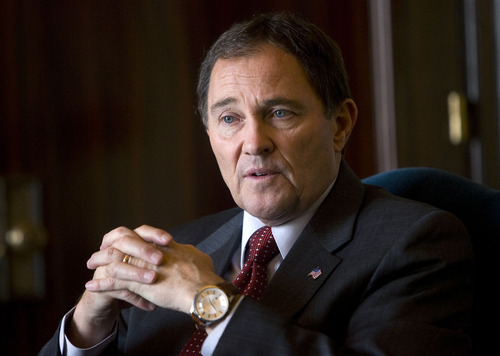This is an archived article that was published on sltrib.com in 2011, and information in the article may be outdated. It is provided only for personal research purposes and may not be reprinted.
Gov. Gary Herbert vetoed a bid Wednesday to move state government back to a five-day workweek, saying the change would cost money Utah doesn't have and noting that surveys indicate the public and state employees support the current four-day schedule.
As a compromise, Herbert issued an executive order directing state agencies to ensure that, by Oct. 1, yet-to-be-determined "critical" services are available either online, by phone or in person five days a week.
"I'm going to take him at his word and see what happens this year. I just hope it works," said Rep. Mike Noel, R-Kanab, who sponsored the vetoed bill. "Business functions five days a week, and when we take 20 percent of the workweek out ... the people aren't served appropriately."
Noel said he heard from judges in rural Utah who were upset that the state Division of Child and Family Services couldn't be reached. He was also concerned about residents not being able to get food stamps on Fridays.
Herbert said in a statement that the bill infringed on the governor's constitutional authority and would do away with the four 10-hour-a-day system that is popular with the public and state workers. The governor also said it would cost money.
Jeff Herring, executive director of the Utah Department of Human Resource Management, said that returning to a five-day workweek would cost nearly $800,000 — a figure his department shared with legislators but that they didn't budget for.
Noel said lawmakers didn't really buy the estimate, since they didn't see much in the way of savings when the four-day workweek took effect. Noel's bill would have required that each agency have at least one office open Friday and didn't mandate that all workers go to a five-day week.
Then-Gov. Jon Huntsman Jr. launched the four-day workweek on a trial basis in August 2008. Herbert was skeptical of the idea when he took over, but he decided to continue the experiment when surveys indicated support from the public and state workers.
Huntsman predicted there could be $3 million in annual energy savings alone, but a legislative audit found the savings likely fell short of $1 million.
Audry Wood, executive director of the Utah Public Employees Association, which represents state workers, said her group was interested in giving employees the maximum flexibility and avoiding upheaval.
"The employees have worked [a four-day] schedule for 2 1/2 years now, and a lot of them had to make major adjustments to their lives to work that schedule," she said. "They have really adapted to this four-10 schedule, and to keep going back and forth is very disruptive."
The workweek measure was one of four bills Herbert vetoed Wednesday, the final day for him to act on legislation.
He vetoed a bill that sought to earmark a portion of the state sales tax to road maintenance, which the bill's sponsor, Sen. Stuart Adams, R-Layton, said has suffered, especially in rural areas, as gas-tax revenue going to street projects has dwindled.
"I'm disappointed in the governor and this veto," said Adams, former chairman of the Utah Transportation Commission. "Everyone acknowledges that, sometime, there will be a gas-tax increase. This was an effort to avoid it or postpone it."
Herbert objected to earmarking the funds, fearing that would hinder the ability to address other budget priorities such as education, human services and economic development.
Adams said it's too early to say whether lawmakers might attempt to override Herbert's action, although he noted it passed by margins large enough to quash the veto.
The governor also vetoed another Adams bill, SB294, which Herbert said wasn't publicly released until the next-to-last day of the session. There was concern that the measure would hamper the state's health care exchange and shift health insurance premiums in a way that would harm older Utahns.
Herbert also nixed legislation, sponsored by Sen. Howard Stephenson, R-Draper, that sought to use technology to help steer students toward college degrees that businesses desire.
It remains to be seen if there is support in the Legislature to try to override Herbert's vetoes. Members of the House and Senate will be surveyed during the next two weeks and, if two-thirds support such action, lawmakers could call themselves into session to cast the override votes.
Both of Adams' bills and the Stephenson measure passed the Legislature with greater than a two-thirds majority.
Governor inks bills
Gov. Gary Herbert acted Wednesday on the last of the bills on his desk from the 2011 legislative session, including measures creating a board to study moving the state prison in Draper and protecting hospitals from malpractice suits.
HB445, sponsored by Rep. Greg Hughes, R-Draper, creates a panel to advise the governor on the potential relocation of the prison. Hughes sponsored the bill because he fears some groups interested in the prison property may have been trying to circumvent the bidding process.
Despite objections of personal-injury lawyers, Herbert signed SB150, which spares hospitals from being sued for permitting problem doctors to practice at their facilities.
The bill had wide legislative support, but Rep. Kay McIff, R-Richfield, a former state judge, fears it is "highly unlikely to survive a constitutional challenge." Such a challenge could take years to surface.
In all, Herbert signed 466 bills into law — one of which was repealed — vetoed four measures and declined to sign one, a resolution urging federal funding for the Central Utah Project that was moot by the time it reached his desk.



